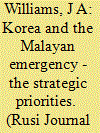| Srl | Item |
| 1 |
ID:
133795


|
|
|
|
|
| Publication |
2014.
|
| Summary/Abstract |
China's growing missile and nuclear forces will pose a complex, challenging threat to America and its allies.
CHINA IS INCREASINGLY A FORCE TO BE RECKONED WITH, not only economically but also militarily. Its aggressive stance toward some of its neighbors, along with Asia's growing economic importance and the need to assure U.S. allies that Washington will increase its attention to the region despite budgetary challenges and fractious domestic politics, prompted the Obama administration to announce a "rebalance" toward Asia.
|
|
|
|
|
|
|
|
|
|
|
|
|
|
|
|
| 2 |
ID:
137370


|
|
|
|
|
| Summary/Abstract |
This article systematically examines the perceptual dimension of US–China–ASEAN relations. It specifically focuses on Chinese perceptions of American intentions in Southeast Asia, Chinese perceptions of the impact on China of the US's return to Southeast Asia, and suggestions of the Chinese scholarly community as to how China should respond to the US's return. Chinese scholars believe that the US returns to Southeast Asia for a variety of reasons and one of the most important is to manage the rise of China, and that the US's return has both positive and negative impacts on China's interests and the negative impact outweighs the positive. Overall, Chinese perceptions of the US return, especially Chinese scholars’ suggested response, indicate that Chinese scholars have internalized the strategy of peaceful rise which would give us added confidence that China is seriously committed to this strategy. If both the US and China stick to their relevant commitments, the rise of China, unlike that of most great powers in the past, would quite likely be peaceful.
|
|
|
|
|
|
|
|
|
|
|
|
|
|
|
|
| 3 |
ID:
089345


|
|
|
|
|
| Publication |
2009.
|
| Summary/Abstract |
How can we explain foreign policy variation among UN member states? Brazil and Mexico are the most likely cases for international primacy in the UN system, given their territorial dimension, demographic tendencies, economic importance, geopolitical location and relative weight in Latin America. Yet, despite their structural similarities, their policies and behaviour in the UN system have varied, both in terms of engagement with the Security Council and commitment regarding peacekeeping. By comparing two of Latin America's most influential countries, this study identifies the underlying conditions and mechanisms that explain their differences in behaviour and policy in the UN. In particular, this article analyses and contrasts how geopolitics and civil-military relations in Brazil and Mexico affect their incentives to participate in international organizations and their overall international commitment to peace.
|
|
|
|
|
|
|
|
|
|
|
|
|
|
|
|
| 4 |
ID:
104755


|
|
|
| 5 |
ID:
132560


|
|
|
|
|
| Publication |
2014.
|
| Summary/Abstract |
Given the importance of Central and East Asia to the current U.S. strategic landscape, it is curious that policymakers and historians largely overlooked the countries of South Asia during the Cold War, and especially the strategic import of Bangladesh. Nestled between the current con?ict in Afghanistan and threats of future competition with China or North Korea, and particularly vulnerable to "environmental emergencies," the region perhaps deserves a more strategic assessment than has previously been afforded A recent trove of studies on South Asia-focused on the Bay of Bengal writ large and Bangladesh speci?cally- illuminates the historical context for U.S. and global engagement in the region, accounting for the geopolitical, strategic and economic importance of the often- neglected Bangladesh.
|
|
|
|
|
|
|
|
|
|
|
|
|
|
|
|
| 6 |
ID:
137453


|
|
|
|
|
| Summary/Abstract |
The Bay of Bengal region is now growing in economic and strategic importance. The good economic prospects of many Bay of Bengal states are making the region a cockpit for Asian growth and a key economic connector between East and South Asia. This article looks at strategic developments in the Bay of Bengal and their implications for our understanding of the Indo-Pacific. It argues that the Bay of Bengal needs to be understood as a region with its own particular strategic dynamics and issues. The area is fast becoming a key zone of strategic competition in Asia and is of vital strategic importance to India.
|
|
|
|
|
|
|
|
|
|
|
|
|
|
|
|